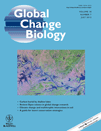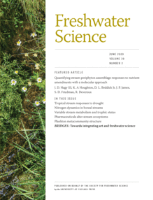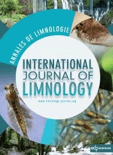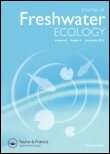
LIMNOLOGY
Scope & Guideline
Connecting Researchers in Limnology and Ecology
Introduction
Aims and Scopes
- Freshwater Ecosystem Dynamics:
Research focused on understanding the interactions and processes within freshwater ecosystems, including biotic and abiotic factors that influence community structure and function. - Biodiversity and Conservation:
Studies that explore the diversity of aquatic organisms and their habitats, including assessments of invasive species, conservation strategies, and the impacts of human activities on freshwater biodiversity. - Water Quality and Pollution:
Investigations into the chemical and biological indicators of water quality, the effects of pollutants, and the mechanisms of nutrient cycling in freshwater bodies. - Climate Change Impacts:
Research examining how changing climatic conditions affect freshwater ecosystems, including temperature variations, hydrological changes, and species responses. - Technological Advances in Monitoring:
The development and application of innovative techniques such as environmental DNA (eDNA) methods for monitoring aquatic biodiversity and assessing ecosystem health.
Trending and Emerging
- Environmental DNA (eDNA) Applications:
The increasing use of eDNA methodologies highlights a trend towards non-invasive monitoring techniques for biodiversity assessment, allowing researchers to gather data on species presence and distribution more efficiently. - Impacts of Climate Change on Freshwater Systems:
Research focusing on how climate change influences temperature, hydrology, and species distributions in freshwater environments is becoming increasingly relevant as global climates shift. - Invasive Species Research:
There is a growing emphasis on understanding the impacts of invasive species on native ecosystems, including their ecological effects and management strategies. - Functional Ecology and Ecosystem Services:
Studies examining the functional roles of various species within freshwater ecosystems and their contributions to ecosystem services are gaining importance, reflecting a shift towards applied ecological research. - Integrated Watershed Management:
Research that investigates the interplay between land use, water quality, and ecosystem health at the watershed scale is becoming more prominent, indicating an integrated approach to freshwater management.
Declining or Waning
- Traditional Taxonomic Studies:
Research centered on the detailed taxonomy of specific taxa has seen a decline, potentially overshadowed by broader ecological and conservation-related studies. - Static Habitat Studies:
Research focusing solely on static assessments of freshwater habitats without considering dynamic environmental factors is becoming less prevalent, as there is a greater emphasis on understanding ecosystem interactions and changes over time. - Historical Limnology:
Studies that primarily focus on historical data without linking to current environmental changes and management practices are less frequently published, indicating a shift towards more applied and contemporary research.
Similar Journals

LIMNOLOGY AND OCEANOGRAPHY-METHODS
Advancing aquatic research through innovative methodologies.LIMNOLOGY AND OCEANOGRAPHY-METHODS is a premier journal published by WILEY, dedicated to advancing the understanding of methodologies in limnology and oceanography. With an ISSN of 1541-5856, this esteemed publication has established itself within the academic community, holding a solid Impact Factor and proudly ranking in the Q1 category for Ocean Engineering according to 2023 metrics. The journal, which has been converged since 2003, encompasses a broad scope that includes innovative techniques and applications essential for aquatic research and environmental monitoring. As a leader in the field, it is ranked #32 out of 105 journals in Ocean Engineering, placing it within the 70th percentile of its category. While it operates under subscription access, LIMNOLOGY AND OCEANOGRAPHY-METHODS serves as an invaluable resource for researchers, professionals, and students alike, providing critical insights that drive advancements in aquatic sciences.

GLOBAL CHANGE BIOLOGY
Advancing Insights into Ecological TransformationsGLOBAL CHANGE BIOLOGY, published by Wiley, is a leading journal dedicated to advancing the scientific understanding of the relationships between biological systems and global environmental changes. With an impressive impact factor placing it in the Q1 category across multiple disciplines—including Ecology, Environmental Chemistry, and Global and Planetary Change—this journal is essential for researchers, professionals, and students aiming to stay at the forefront of this dynamic field. The journal has a rich history since its inception in 1995, continually providing a platform for high-quality research that informs policy and management practices worldwide. Although it is not open access, the journal remains a valuable resource for those committed to exploring the complexities of ecological and environmental change. With a Scopus ranking of #3 in Global and Planetary Change and #6 in both Ecology and Environmental Chemistry, GLOBAL CHANGE BIOLOGY continues to shape the dialogue on the pressing environmental challenges of our time.

Freshwater Science
Fostering Dialogue in Aquatic ScienceFreshwater Science is a pivotal journal published by the University of Chicago Press, dedicated to advancing the understanding of freshwater ecosystems and their biodiversity. With an ISSN of 2161-9549 and an E-ISSN of 2161-9565, this journal has been a vital resource in the fields of Aquatic Science and Ecology, consistently ranked in the Q2 quartile across multiple categories in 2023. The journal encapsulates rigorous research and innovative studies aimed at addressing the ecological dynamics of freshwater environments from 2012 to 2024. Researchers and practitioners benefit from its open access options, which enhance the dissemination of knowledge while contributing to a better understanding of aquatic systems. With Scopus rankings that place it in the top 30% of its fields, Freshwater Science plays an influential role in fostering scientific dialogue and collaboration among professionals, making it an essential publication for anyone invested in freshwater conservation, management, and ecological impact.

ANNALES DE LIMNOLOGIE-INTERNATIONAL JOURNAL OF LIMNOLOGY
Bridging Theory and Practice in Freshwater ScienceANNALES DE LIMNOLOGIE-INTERNATIONAL JOURNAL OF LIMNOLOGY is a distinguished scientific journal dedicated to the field of limnology, focusing on freshwater ecosystems and their ecological dynamics. Published by EDP SCIENCES S A, this journal has been a vital resource for researchers and professionals since 1965, fostering a deep understanding of aquatic environments through quality research and scholarly discussions. The journal was indexed in Scopus, where it ranked in the 37th percentile within the Agricultural and Biological Sciences category, emphasizing its contribution to aquatic science. While its coverage has been discontinued in Scopus since 2021, the journal continues to engage its readership with critical insights and reviews in limnology. ANNALES DE LIMNOLOGIE promotes open access to facilitate the dissemination of valuable knowledge, making it an essential platform for students, researchers, and professionals who strive to advance our understanding of freshwater systems.

JOURNAL OF FRESHWATER ECOLOGY
Championing open access to aquatic science insights.JOURNAL OF FRESHWATER ECOLOGY, published by Taylor & Francis Inc, is an esteemed source of research dedicated to advancing the understanding of freshwater ecosystems. Established in 1981, this Open Access journal has provided a platform for innovative studies and groundbreaking articles relevant to the fields of Aquatic Science and Ecology. With its HIndex reflecting a commitment to quality scholarship, the journal is currently classified in the Q3 category for both Aquatic Science and Ecology, Evolution, Behavior and Systematics, indicating its respectable impact within these disciplines. The journal ranks within the 45th percentile in Ecology and the 41st percentile in Aquatic Science on Scopus, highlighting its relevance to a global audience of researchers and practitioners. By facilitating unrestricted access to research findings since 2017, JOURNAL OF FRESHWATER ECOLOGY aims to enrich our understanding of freshwater systems and their conservation, making it an essential resource for those invested in ecological research and environmental sustainability.

MARINE AND FRESHWATER RESEARCH
Bridging science and environmental stewardship.Marine and Freshwater Research is a prestigious journal published by CSIRO PUBLISHING that serves as a key platform for the dissemination of cutting-edge research in the fields of Aquatic Science, Ecology, and Oceanography. With an impactful presence since its inception in 1948, the journal provides critical insights into the dynamics of freshwater and marine ecosystems, promoting interdisciplinary approaches that contribute to our understanding of biodiversity and sustainability. Currently ranked in the Q2 category across major scientific domains, including Ecology and Aquatic Science, it enjoys a robust academic reputation supported by impressive Scopus rankings, such as Rank #66/247 in Aquatic Science and Rank #44/145 in Oceanography, reflecting its high citation impact and relevance. While offering a subscription-based access model, the journal remains dedicated to fostering dialogue and innovation within the scientific community, aiming to bridge the gap between research findings and practical applications in environmental management. Located in Australia, Marine and Freshwater Research is an essential resource for researchers, professionals, and students dedicated to exploring the complexities of aquatic ecosystems and advocating for their preservation.

Journal of Oceanology and Limnology
Exploring the Depths of Aquatic ResearchJournal of Oceanology and Limnology, published by SCIENCE PRESS, is a premier academic journal dedicated to advancing the fields of oceanography and limnology. With an ISSN of 2096-5508 and E-ISSN 2523-3521, this journal has emerged as a vital resource since its inception, aiming to disseminate cutting-edge research and comprehensive studies on aquatic environments. Based in China and indexed with notable rankings in Scopus, including a Q2 category in Oceanography and a Q3 category in Water Science and Technology, this journal significantly contributes to knowledge in these crucial scientific disciplines. The H-index for the journal is currently being established, reflecting its evolving impact within the academic community. Moreover, the open access model promotes wider dissemination, ensuring that research findings are accessible to a global audience. Covering a diverse range of topics from ecosystem health to climate impact on water bodies, the Journal of Oceanology and Limnology aspires to foster interdisciplinary dialogue and innovation among researchers, professionals, and students engaged in understanding and preserving aquatic life.

Water Biology and Security
Advancing aquatic knowledge for a sustainable future.Water Biology and Security, published by KEAI PUBLISHING LTD, is a pivotal open-access journal that has been addressing critical issues in the interdisciplinary fields of water sciences, aquatic biology, and environmental sustainability since its inception in 2022. With an E-ISSN of 2772-7351 and a distinguished ranking within the top quartile (Q1) of several categories including Agricultural and Biological Sciences, Animal Science and Zoology, Aquatic Science, and Water Science and Technology, the journal stands out as a leading platform for innovative research. Based in Beijing, China, and supported by an impressive impact factor derived from its Scopus rankings, the journal aims to disseminate high-quality and impactful research that addresses the challenges related to water resources and ecosystems. Its open-access format enhances accessibility, ensuring that vital information reaches policymakers, practitioners, and scholars worldwide. As we converge through 2024, the journal aspires to foster a vibrant scholarly community, facilitating dialogues that inform practice and advance the scientific understanding of aquatic environments.

INTERNATIONAL REVIEW OF HYDROBIOLOGY
Fostering Knowledge for a Sustainable Aquatic FutureINTERNATIONAL REVIEW OF HYDROBIOLOGY is a prestigious academic journal dedicated to the dynamic fields of Aquatic Science and Ecology, Evolution, Behavior, and Systematics. Published by a reputable German publisher, this open-access journal ensures that groundbreaking research is readily available to a global audience, fostering collaboration and innovation within the scientific community. With an impressive impact factor and classification within the Q2 category of both Aquatic Science and Ecology, it ranks notably high on Scopus, standing at 211 out of 721 in Ecology and 84 out of 247 in Aquatic Science as of 2023. Covering a broad scope from fundamental hydrobiological research to applied ecological studies, the journal plays a crucial role in advancing knowledge and addressing contemporary environmental challenges. Researchers, professionals, and students will find INTERNATIONAL REVIEW OF HYDROBIOLOGY to be an essential resource for informing their own work and contributing to the global dialogue on aquatic systems and their conservation.

Aquatic Biology
Fostering Collaboration in Aquatic ResearchAquatic Biology, published by INTER-RESEARCH, is a leading open-access journal dedicated to the scientific exploration of aquatic ecosystems, promoting innovative research in the fields of aquatic science, ecology, and oceanography since its inception in 2007. With an E-ISSN of 1864-7782, the journal publishes original articles, reviews, and data papers that contribute to the understanding of aquatic biology in its myriad forms. As of 2023, it holds a respectable Q3 ranking across multiple categories including Aquatic Science and Ecology, reflecting its sustained impact within the scientific community. Situated in Germany, Aquatic Biology operates a policy of open access since 2014, ensuring that valuable research findings are readily available to researchers, professionals, and students worldwide, thus fostering collaboration and knowledge dissemination. By addressing diverse aquatic topics, the journal plays a crucial role in advancing the study and conservation of marine and freshwater environments, making it an essential resource for anyone seeking to deepen their understanding of aquatic systems.